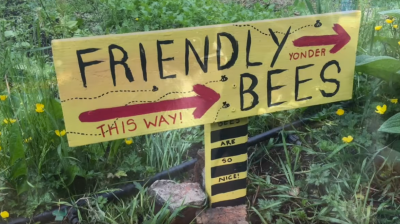WWU's Outback Farm launches new teaching apiary and fundraiser
Western Washington University has launched a crowdfunding campaign to support the development of a new, world-class teaching apiary.
The existing two beehives, located at the Outback Farm, have been a major draw for student engagement since their arrival in May, and in partnership with local beekeeper Chris Harrington of Beeagoodcitizen, plans are underway to expand the facility and the learning opportunities.
“We have the chance to be a regional leader in pollinator advocacy, research, and education,” said Outback Farm Manager Terri Kempton.
News stories about colony collapse disorder and the rapid decline of bees and other pollinator species are becoming increasingly common due to a complex combination of habitat loss, pesticides, and a parasite called the Varroa mite that infects beehives. This is a huge problem, as about one-third of our diet comes from insect-pollinated plants. University programs like the Outback apiary that combine research, hands-on learning, and an increase in pollinator habitat can help turn the tide.
WWU is home to the 5-acre organic Outback Farm, which serves as a place of reflection, education, advocacy, community, and education on food justice, permaculture, and agriculture. The apiary is a natural fit for the farm and the passionate students who take care of them. Funding will allow the Outback to construct a modern apiary classroom facility, including an informational kiosk and glass-sided observation hive. The program will highlight student-led teaching for peer-to-peer learning and engagement throughout campus and the Bellingham community.
Student beekeeper Kristy Lee said she thought the growth of the Outback's apiary was a huge opportunity for the Western community.
“We have such a big vision for the apiary here in the Outback; we’re so happy to educate our community and our campus about bees...we’re just really excited,” she said.
Daniel Korus, a WWU graduate student and Outback beekeeper, agreed.
“I love bees, I love beekeeping, and I think bees are really important to the community and to the world,” Korus said.
Their most ambitious goals include creating a queen bee breeding program to combine the genes of bees with mite resistance (VHS traits) with locally-adapted bees that thrive in the Pacific Northwest.
“There are thousands of students that might not normally be exposed to honey bees who can learn how easy it is to take care of them and the direct link that they have between the food that we eat and the environment we enjoy,” Harrington said.
To contribute to the Outback Apiary, please see https://www.vikingfunder.com/wwubeeapiary for more information.
